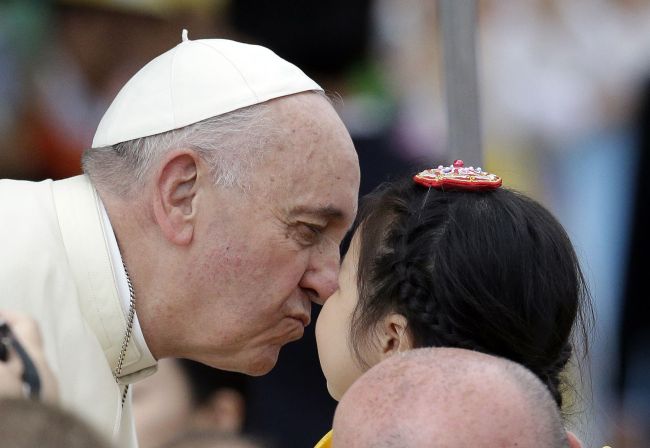Pope Francis on Sunday made his strongest appeal yet to China since becoming pope, saying he “earnestly” hopes for a dialogue with the countries which the Vatican has no diplomatic ties with.
“In this spirit of openness to others, I earnestly hope that those countries of your continent with whom the Holy See does not yet enjoy a full relationship, may not hesitate to further a dialogue for the benefit of all,” the pope said in a speech to some 70 Asian bishops in the western coastal city of Seosan, South Chungcheong Province, 151 kilometers south of Seoul. He added that he meant “fraternal” dialogue, not a political one.
The pontiff is on a five-day apostolic voyage of Korea, his first outing to the region since taking papacy in March last year.
Coming a few days after a rare exchange between the pope and Beijing in the sky on his way to Korea, the comment was widely seen as directed at China.
 |
| Pope Francis kisses a child upon his arrival for a mass concluding the 6th Asian Youth Day in Haemi, South Chungcheong Province, Sunday. (AFP-Yonhap) |
The Vatican’s spokesperson, the Rev. Federico Lombardi, however said later that China is not the only Asian country with which the Holy See wants to enter into a diplomatic relationship. There are North Korea, Vietnam, Myanmar, Laos, Bhutan and Brunei, he said.
“This offer of the pope for dialogue is to all these lands and not just one, even if China is the biggest,” he said.
China represents one of the main challenges that the Vatican faces in the region, home to 60 percent of the world’s population. Only 3 percent of Asians are Catholic.
Beijing and Rome’s diplomatic ties were severed in 1951. The Chinese Communist Party then set up its own church outside the pope’s authority.
During the meeting with Asian bishops, the pontiff laid out priorities for Asian evangelism, urging them to be open to people of diverse cultures while retaining its Catholic identity.
“On this vast continent, which is home to a great variety of cultures, the church is called to be versatile and creative in her witness to the Gospel through dialogue and openness to all,” he said.
Their meeting took place at the Haemi sanctuary in Seosan, where about 1,000 early Korean Christians were executed for their faith from 1866 to 1882.
The pope and bishops were there for the sixth Asia Youth Day, a festival of young Catholics in the region.
Asian evangelism and encouragement of the Korean church are two main purposes of the top cleric’s visit here.
In a symbolic moment for Korea’s 5.4 million Catholics, the pope beatified 124 Korean martyrs in a large-scale outdoor Mass at the heart of Seoul on Saturday.
He told the hundreds of thousands of Koreans who filled the streets of Gwanghwamun that their ancestors’ martyrdom had lessons for the church around the world today.
“They were willing to make great sacrifices and let themselves be stripped of whatever kept them from Christ ― possessions and land, prestige and honor ― for they knew that Christ alone was their true treasure,” the pontiff told the crowd in his sermon.
“They challenge us to think about what, if anything, we ourselves would be willing to die for.”
The centerpiece of his apostolic visit here drew some 800,000 Koreans, turning the streets of Gwanghwamun into a virtual outdoor cathedral.
Among the 124 Koreans beatified is Paul Yun Ji-chung, one of Korea’s first martyrs who was beheaded in 1791 for renouncing Confucian ancestral rites for his mother.
For many Korean Catholics, the ceremony was a strong message of encouragement from the Holy Father to their church, which has grown from nonexistence 230 years ago to the country’s third-largest faith today.
Catholics account for roughly 11 percent of the population after Protestants and Buddhists.
The pope is to leave for the Vatican on Monday afternoon after celebrating a Mass for peace and reconciliation at Myeongdong Cathedral in Seoul in the morning.
By Lee Sun-young (milaya@heraldcorp.com)



